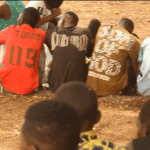
Multidisciplinary artist and fashion designer Nana Yaa Asare-Boadu has called for renewed government investment in Ghana’s cotton sector.
She described it as a crucial step toward building a sustainable fashion economy and creating jobs across the country.
Speaking on the sidelines of the Diplomatic Fashion Gala for Charity held in Accra over the weekend, Asare-Boadu lamented the near-collapse of Ghana’s once-vibrant cotton industry, particularly in the northern regions, where textile factories now lie abandoned.
“I think the government should put more into the cotton sector, bringing back factories. We used to have factories in the north, but none are operating now. Everything is being imported from China and elsewhere, and it’s such a shame,” she said.
The designer, who has worked across fashion, art, and sustainability, emphasized that revitalizing the local cotton industry could help preserve traditional spinning and weaving methods while reducing Ghana’s dependence on synthetic fabrics such as polyester.
“Our traditional methods are being lost, and we’re using more polyester, which seeps into the skin. Cotton is more breathable and better for our health,” she explained, adding that such a revival would not only boost employment but also reconnect younger generations with Ghana’s textile heritage.
Ms Asare-Boadu expressed concern that young people were increasingly abandoning indigenous crafts in favor of social media-driven aspirations.
“In the north, very few people still practice traditional spinning. Everyone wants to be on TikTok or Instagram. It’s a shame these things are being lost,” she noted.
She urged policymakers to take inspiration from other nations that have integrated traditional craft into modern economic frameworks.
“Countries like Japan have preserved their kimono traditions, and Burkina Faso is thriving with its organic cotton industry. Ghana can do the same if we invest in this space,” she said.
The Diplomatic Fashion Gala for Charity, which featured brands such as Seemee, Complex Department, Victoria Grace, S3rwa, and Kondo, brought together designers, diplomats, and cultural leaders to celebrate fashion’s role in social impact and sustainability.
Asare-Boadu’s remarks have reignited conversations around the potential of Ghana’s textile and fashion industries to drive local economic growth — if given the right policy attention and investment.
The Diplomatic Fashion Gala for Charity brought together members of the diplomatic corps, senior executives from top corporate institutions, and leading figures from the creative sector.
The high-profile event served as a platform to promote cross-sector collaboration, showcase Ghanaian fashion excellence, and raise awareness around sustainability and cultural preservation.

